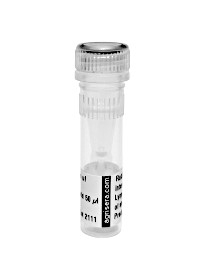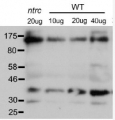1

Anti-PEPC | phosphoenolpyruvate carboxylase, DyLight® 650 conjugated (40 µg)
- Product Info
-
Immunogen: KLH-conjugated synthetic peptide well conserved PEPC1 and sequences from different plant species including Arabidopsis thaliana Q9MAH0, At1g53310 (PEPC 1), Q84VW9, At3g14940 (PEPC 3). The peptide chosen to elicit this antibody is also perfectly conserved in bacterial type of this enzyme NP_177043.2 (PEPC 4).
For Zea mays, the peptide is converved in PEP1 and PEP4 isoforms.Host: Rabbit Clonality: Polyclonal Purity: Immunogen affinity purified serum, in PBS pH 7.4, conjugated to DyLight® 650.
Format: Liquid in PBS pH 7,4. Quantity: 40 µg Storage: Store at 4°C for 12-18 months, A preservative may be added for long time storage up to 2 years. Spin briefly the tube before use. Tested applications: Immunofluorescence (IF), Western blot (WB) Recommended dilution: To be determined by end user Expected | apparent MW: 110 | 105 kDa - Reactivity
-
Confirmed reactivity: Ananas comosus, Arabidopsis thaliana, Synechocystis PCC 6803, Chromera velia, Hordeum vulgare, Jatropha curcas, Lupinus sp, , Mesembryanthemum crystallinum, Nicotiana tabacum, Oryza sativa, Saccharum spp, hybrid clone C91-301, Salsola laricifolia, Zea mays, Synechocystis sp, , Phaeodactylum tricornutum (strain CCAP 1055/1), Thalassiosira weissfloggi Predicted reactivity: Brassica napus, Cucumis sativus (PEPC1, PEPC2, PEPC3), Flaveria bidentis, Flaveria trinervia, Glycine max, Lupinus albus, Mammillaria thornberi, Manihot esculenta, Manihot obovata, Medicago sativa, Morinda citrifolia, Nannochloropsis gaditana CCMP526, Nopalea gaumeri, Opuntia macbridei, Pachycereus pringlei, Saccharum spp, Solanum tuberosum, Spinacia oleracea, Streptanthus tortuosus, Pachycereus hollianus, Pisum sativa, Phaseolus vulgaris, Populus sp.,Triticum aestivum, algae, diatoms: Thalassiosira pseudonana, other species: Salmonella sp., Schiedea hookeri, Shigella sp. Schiedea sarmentosa, Streptanthus farnsworthianus, Tacinga saxatilis,Yersinia sp. Vibrio sp., Quercus sp.
Species of your interest not listed? Contact usNot reactive in: No confirmed exceptions from predicted reactivity are currently known, - Additional Information
-
Additional information: DyLight® 650 has Amax = 652 nm, Emax = 672 nm. DyLight® is a registered trademark of Thermofisher Inc., and its subsidiaries. - Background
-
Background: PEPC (phosphoenolpyruvate carboxylase), EC=4,1,1,31, belongs to an enzyme family of carboxy-lyases that is catalyzing adding fo carbon dioxide to phosphoenolpyruvate (PEP) to form oxaloacetate, Alternative names: PEPCase 1, PEPCase 3, PEPC 1, PEPC 3. - Protocols
-
Agrisera Western Blot protocol and video tutorials
Protocols to work with plant and algal protein extracts
Agrisera Educational Posters Collection
- Reviews:
-
This product doesn't have any reviews.
Accessories

AS07 257 | Clonality: Polyclonal | Host: Rabbit | Reactivity: A. thaliana, H. vulgare, O. sativa, Z. mays, cyanobacteria, diatoms
compartment marker of chloroplast stroma

AS03 037 | Clonality: Polyclonal | Host: Rabbit | Reactivity: global antibody and compartment marker for higher plants, lichens, algae, cyanobacteria, dinoflagellates, diatoms
Benefits of using this antibody
50% discount on matching standard/positive control
AS01 017S RbcL | Rubisco positive control/quantitation standard
Use promotional code: Stand50

AS15 2873 | Clonality: Polyclonal | Host: Rabbit | Reactivity: A. thaliana, Chlamydomonas sp. (strain W80), C. sativus, G. hirsutum, H. vulgare, O. sativa, Z. mays
Benefits of using this antibody
50% discount on matching standard/positive control
AS15 2873S SBP | Sedoheptulose-1,7-bis phosphatase positive control/quantitation standard
Use promotional code: Stand50

